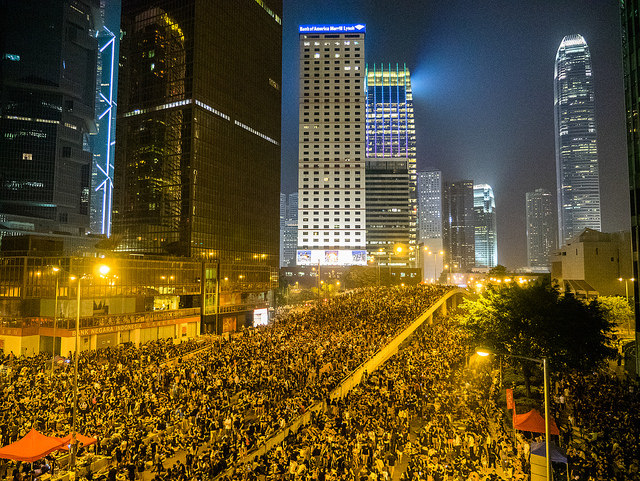What’s Going on in Hong Kong? Posted by sasha on Oct 3, 2014 in Uncategorized
We’ve been talking about Hong Kong a lot here on the blog lately – we introduced the SAR in our ongoing series, had a post about Cantonese, and took a video tour of Hong Kong island. Later this month we’ll have a few more videos, showing Kowloon and Lantau island. For now, let’s take a break to talk about the political unrest that has taken over in Hong Kong, the reasons behind it, and the prospects for the future.
Here’s an intro to the protests from The Guardian.
Why are people protesting in Hong Kong?

By Pasu Au Yeung from www.flickr.com
In I2017, Hong Kong will hold an election to choose a new chief executive (basically the mayor). Under the current system, the chief executive is elected by a 1,200-member committee full of Beijing loyalists. While China has said that the 2017 election can go forward as one person, one vote, they also want to control who is on the ballot. Beijing wants to vet the candidates and approve them, and Hong Kongers want nothing to do with this. According to Li Fei (a Chinese official), this process is necessary to ensure that the chief executive “loves China, loves Hong Kong and will safeguard the country’s sovereignty, security and development interests.” For the protestors, simply choosing the next leader is not enough – they want current chief executive C.Y. Leung gone. Many people in Hong Kong are fed up not only with the Chinese government, but with mainland Chinese who flock to the Special Administrative Region by the millions every year and buy up commodities from real estate to baby formula. The growing housing bubble of Hong Kong is only being inflated by rich mainlanders, and the locals are starting to show frustration. Some in HK even go so far as to refer to people from the mainland as “locusts.”
Occupy Central

Occupy Central’s logo.
The master plan of pro-democracy people in HK has been a campaign called “Occupy Central” (佔中), started by professor Benny Tai. Taking a page out of the Occupy Wall Street playbook from a few years back, protestors want to disrupt the city’s financial district as a counter to Beijing, which relies much on the massive Hong Kong economy. Officially launched in the wee hours of September 28th, the protests turned ugly the next night – tear gas, pepper spray, and batons were employed by police to disperse the crowds. As a sign of their determination, protestors began wearing protective glasses and masks. They also carry umbrellas as a shield from the rain, the sun, and the pepper spray, leading some to call this the “Umbrella Revolution.” When compared to other mass protests of recent memory, people in Hong Kong have been (not surprisingly) incredibly civil – picking up trash, staying off the grass, and even doing their homework. The protests have gotten a ton of attention from international media, and it’s everywhere you look on TV and in the news. Almost everywhere, that is…
A short BBC clip of the protests and police reactions.
Censorship on the Mainland
A little bit on the censorship in Chinese media from CNN.
Not surprisingly, the Chinese government does not want scenes of the protests being broadcast on the mainland. As this is being seen by many as the biggest political challenge to the Communist Party of China since the pro-democracy movement that led to the Tiananmen Square massacre in 1989, China is doing everything in its power to make sure that mainlanders don’t get any ideas from Hong Kong. Instagram was added to the list of blocked sites in China to ensure that photos from the protests were not making their way onto the smart phones of mainlanders, and coverage on channels such as CNN has mysteriously blacked out. While they can block coverage on television and social media, there’s little the Chinese government can do about mainland tourists visiting Hong Kong and being exposed to the protests. Read up a bit more on this issue in this great NY Times article.
What’s the solution?
So far, it seems as if neither side is willing to budge – the protestors don’t want to accept Beijing’s offer and the Chinese government seems unlikely to cave in to demands. It’s possible that more force could be used, but that would be disastrous for both sides. With an international community still unwilling to trust China after the atrocities of ’89, another violent crackdown on peaceful protests will do serious damage to the country’s reputation going forward. It’s clear that the protestors in Hong Kong are in it for the long haul, and the world’s 24/7 news cycle will be right there with them. Perhaps the best idea out there comes from this excellent article in The Economist, which states “China needs to find a way of allowing its citizens to shape their governance without resorting to protests that risk turning into a struggle for the nation’s soul. Hong Kong, with its history of free expression and semi-detached relationship to the mainland, is an ideal place for that experiment to begin. If Mr Xi were to grasp the chance, he could do more for his country than all the emperors and party chiefs who have struggled to maintain stability in that vast and violent country before him.” Whatever happens in Hong Kong is going to have big implications not only for the city, but also for China and potentially the international community.

Build vocabulary, practice pronunciation, and more with Transparent Language Online. Available anytime, anywhere, on any device.
About the Author: sasha
Sasha is an English teacher, writer, photographer, and videographer from the great state of Michigan. Upon graduating from Michigan State University, he moved to China and spent 5+ years living, working, studying, and traveling there. He also studied Indonesian Language & Culture in Bali for a year. He and his wife run the travel blog Grateful Gypsies, and they're currently trying the digital nomad lifestyle across Latin America.




Leave a comment: